Pulmonology chapter 40 - Study guides, Class notes & Summaries
Looking for the best study guides, study notes and summaries about Pulmonology chapter 40? On this page you'll find 19 study documents about Pulmonology chapter 40.
Page 2 out of 19 results
Sort by
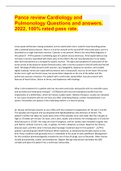
-
Pance review Cardiology and Pulmonology Questions and answers. 2022, 100% rated pass rate.
- Exam (elaborations) • 68 pages • 2023
- Available in package deal
-
- $12.49
- + learn more
Pance review Cardiology and Pulmonology Questions and answers. 2022, 100% rated pass rate. Document Content and Description Below Pance review Cardiology and Pulmonology Questions and answers. 2022, 100% rated pass rate. A two-week-old female is being evaluated, and on examination she is noted to have bounding pulses with a widened pulse pressure. There is a murmur present at the second left intercostal space, and it is described as a rough machinery murmur. Cyanosis is not present. What is th...
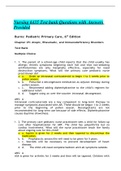
-
Nursing 6435 Test bank Questions with Answers Provided Already Graded A
- Exam (elaborations) • 61 pages • 2021
-
- $18.49
- + learn more
Nursing 6435 Test bank Questions with Answers Provided Burns: Pediatric Primary Care, 6th Edition Chapter 25: Atopic, Rheumatic, and Immunodeficiency Disorders Test Bank Multiple Choice 1. 1. The parent of a school-age child reports that the child usually has allergic rhinitis symptoms beginning each fall and that non-sedating antihistamines are only marginally effective, especially for nasal obstruction symptoms. What will the primary care pediatric nurse practitioner do? a. a. Order a...
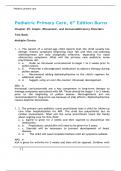
-
Pediatric Primary Care, 6th Edition Burns
- Exam (elaborations) • 61 pages • 2023
-
- $14.59
- + learn more
Pediatric Primary Care, 6th Edition Burns Chapter 25: Atopic, Rheumatic, and Immunodeficiency Disorders Test Bank Multiple Choice 1. 1. The parent of a school-age child reports that the child usually has allergic rhinitis symptoms beginning each fall and that non-sedating antihistamines are only marginally effective, especially for nasal obstruction symptoms. What will the primary care pediatric nurse practitioner do? a. a. Order an intranasal corticosteroid to begin 1 to 2 weeks prior to ...
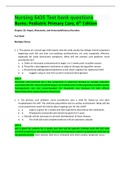
-
Nursing 6435 Test bank questions Burns: Pediatric Primary Care, 6th Edition
- Exam (elaborations) • 56 pages • 2021
- Available in package deal
-
- $9.99
- + learn more
Nursing 6435 Test bank questions Burns: Pediatric Primary Care, 6th Edition Chapter 25: Atopic, Rheumatic, and Immunodeficiency Disorders Test Bank Multiple Choice 1. 1. The parent of a school-age child reports that the child usually has allergic rhinitis symptoms beginning each fall and that non-sedating antihistamines are only marginally effective, especially for nasal obstruction symptoms. What will the primary care pediatric nurse practitioner do? a. a. Order an intranasal cortic...
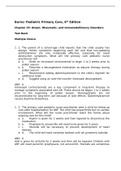
-
Nursing 6435 Questions/Answers ( Burns; Pediatric Primary Care, 6th Edition) TestBank
- Exam (elaborations) • 60 pages • 2021
-
- $17.49
- + learn more
Burns: Pediatric Primary Care, 6th Edition Chapter 25: Atopic, Rheumatic, and Immunodeficiency Disorders Test Bank Multiple Choice 1. 1. The parent of a school-age child reports that the child usually has allergic rhinitis symptoms beginning each fall and that non-sedating antihistamines are only marginally effective, especially for nasal obstruction symptoms. What will the primary care pediatric nurse practitioner do? a. a. Order an intranasal corticosteroid to begin 1 to 2 weeks prior to...
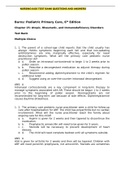
-
NURSING 6435 TEST BANK QUESTIONS AND ANSWERS
- Exam (elaborations) • 60 pages • 2022
-
- $15.99
- + learn more
1. 1. The parent of a school-age child reports that the child usually has allergic rhinitis symptoms beginning each fall and that non-sedating antihistamines are only marginally effective, especially for nasal obstruction symptoms. What will the primary care pediatric nurse practitioner do? a. a. Order an intranasal corticosteroid to begin 1 to 2 weeks prior to pollen season. b. b. Prescribe a decongestant medication as adjunct therapy during pollen season. c. c. Recommend adding diphen...
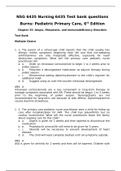
-
NSG 6435 Nursing 6435 Test bank questions Burns: Pediatric Primary Care, MCQs - Completed A
- Exam (elaborations) • 54 pages • 2021
-
- $22.69
- + learn more
NSG 6435 Nursing 6435 Test bank questions Burns: Pediatric Primary Care, 6th Edition Chapter 25: Atopic, Rheumatic, and Immunodeficiency Disorders Test Bank Multiple Choice 1. 1. The parent of a school-age child reports that the child usually has allergic rhinitis symptoms beginning each fall and that non-sedating antihistamines are only marginally effective, especially for nasal obstruction symptoms. What will the primary care pediatric nurse practitioner do? a. a. Order an intran...
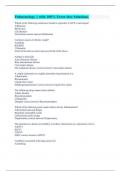
-
Pulmonology || with Complete Solutions.
- Package deal • 19 items • 2024
-
- $88.99
- + learn more
Chapter 40 pulmonology || with 100% Errorless Solutions. Pulmonology || with 100% Error-free Solutions. Pulmonology SmartyPANCE || A+ Verified Solutions. Pulmonology Quizzes || All Answers Are Correct 100%. Pulmonology Quiz || with Errorless Solutions 100%. Pulmonology Practice Questions || with Accurate Answers 100%. Pulmonology Medical Terminolog
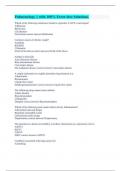
-
Pulmonology || All Questions Answered Correctly.
- Package deal • 19 items • 2024
-
- $77.49
- + learn more
Chapter 40 Pulmonology || Questions and 100% Accurate Answers. Pulmonology || with 100% Error-free Solutions. Pulmonology SmartyPANCE || A+ Verified Solutions. Pulmonology Quizzes || All Answers Are Correct 100%. Pulmonology Quiz || with Errorless Solutions 100%. Pulmonology Practice Questions || with Accurate Answers 100%. Pulmonology – PANCE || w

Did you know that on average a seller on Stuvia earns $82 per month selling study resources? Hmm, hint, hint. Discover all about earning on Stuvia


